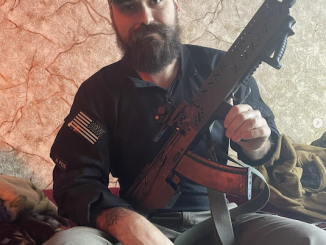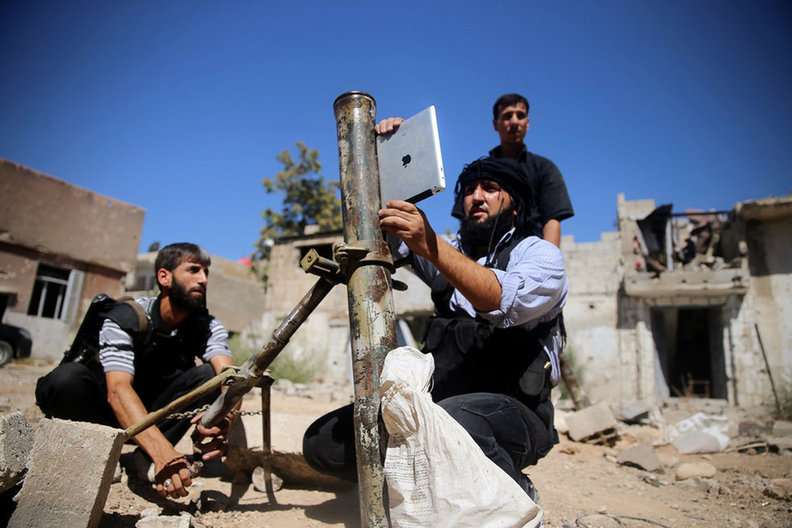“Desert Sniper” is an autobiographical account of Ed Nash’s time fighting as a volunteer with Kurdish forces against ISIS in Syria in 2015 and 2016. Nash had been working as a volunteer with the Free Burma Rangers when he decided in 2015 that the growing list of ISIS atrocities demanded action. With his background in journalism and experience as a liaison for the FBR, he thought he could do some good helping to fight one of the most starkly evil groups the 21st century has yet seen. So, he boarded a plane to the middle east.
Kurdish organization being somewhat subpar, his skills as a journalist were not exploited, and instead he went to a sniper tabor (fighting unit) with a Dragunov, which would be his primary weapon for the rest of his time in country. His book describes the experience from start to finish, including insight into Kurdish culture and politics, training, tactics, and more. He worked with both Kurdish men and women (a substantial fraction of the Kurdish fighters and commanders were female) and with other foreign volunteers like himself and various Special Forces teams from coalition nations like France, the UK, and the US.
There are several things that I particularly appreciate about Nash’s work. First is its honesty and lack of either bravado or squeamishness. Today’s popular sensibilities insist that doing violence must inevitably damage a person psychologically, but this is not true. When one believes in the rightness of one’s actions, one can survive combat without becoming a psychological victim of it. There are certainly physiological exceptions like the prolonged shelling experienced by many in WW1 and the brain injuries caused by pressure waves associated with bomb blasts, but if we are to believe Nash (and I do), one can engage in lethal violence for a just cause and sleep well at night afterward.
On a more technical side, Nash’s journalism experience shows in his writing. The book is engaging and informative, and never left me bored. He gives the reader a feel for the wide variety of situations that he found himself in and the many people we developed relationships with during his time.
Finally, Nash has a good familiarity with firearms, and writings clearly and rationally about them. The guns themselves are not the focus of the book, but when they are relevant they are explained in a way that gun nerds will appreciate. As a sniper, Nash used a Dragunov primarily, but also carried an AK as a secondary rifle. He also had experience with the Zagros and Ser heavy rifles, and cogently explains their use. His descriptions of the range limitations of his SVD will certainly spark interest in readers who are shooters. In fact, Nash provided me with the photo and video material for a video about these Kurdish arms a while back, although I did not identify him by name at that time.
Anyway, this is an inexpensive book and I found it to be an excellent read. Men and women who volunteer to fight like Nash did ought to have their stories more widely known, and recognized for seeing a bad situation and doing something extremely concrete about it, despite often facing daunting legal situations upon their return home as a result.
Kurdish anti-material rifles, based on photos and video provided by Mr. Nash:




“Today’s popular sensibilities insist that doing violence must inevitably damage a person psychologically, but this is not true. When one believes in the rightness of one’s actions, one can survive combat without becoming a psychological victim of it.”
This is perhaps the most aptly phrased expression of a quite true (but very non-PC) sentiment. Good work Ian.
Citing Adrian Carton de Wiart
Governments may think and say as they like, but force cannot be eliminated, and it is the only real and unanswerable power. We are told that the pen is mightier than the sword, but I know which of these weapons I would choose.
Being volunteer for Kurds makes you automatically enemy of Turkey. I realize power-politics of the area are exceedingly complex though. No easy answer, no easy solution.
Following on from Denny, (Hi Denny, Ian has my permission to forward my email address to you).
Some of the “cypher punks” (the guys and girls who came up with bitcoin, and other goodies) spent time in Rajava, the three de facto independent Kurdish cantons.
The pkk had abandoned marxist leninism, and had adopted the libertarian anarcho communism of Murray Bookchin.
The cypher punks were keen to offer they’re skills to help in the project
For their pains, at least one was arrested on his return to the united state
For aiding “terrorists”
Thanks for offer Keith, I will take on it soon. We know, in coarse order, mutually our orientation, so we might be good fit 🙂
WRT psychological damage
I think that a large part of it depends upon how close you are to the actual gore.
And how much in the way of atrocities you get conned into participating in.
Raja value and the other kurdish enclaves have had excellent success against (do your own reading for who funded and created them!) The wahabbi wannabes
Not least because they have girl soldiers
The wahabbis believe that if you get killed by a girl
Then you won’t get into paradise and don’t get to collect your 72 Virgin(goat)s.
Needless to say, the —- funded virgin wannabee farmyard rapists are not keen to be shot dead by a girl
Apparently none of wahabbi goons want to be killed by female sniper; they may be denied “kingdom of heaven” if that happened.
Just finished reading this. Good book: good story, well written, informative and engaging.
Thanks for reviewing this book. For some reason, I remembered Bryan Stevenson’s Just Mercy when reading it, although these are entirely different books. However, after doing a detailed analysis of the characters, which you can see if you check this, I concluded both books delve into the psychological impact of violence and the importance of empathy and understanding in the face of injustice. This books ultimately convey the idea that every person deserves dignity and justice and that it is essential to confront and fight injustice in all its forms.